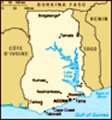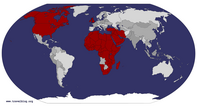Advertisement
Published: July 12th 2010
7/11/10
Today some of us drove around 4 hours to get to a monkey sanctuary (some took the day off and some went to Duku’s shrine), but of course our little sanctuary was much more than that. It’s a village that worships its monkeys. The story goes like this: there was a hunter who found a shrine surrounded by monkeys. He went about his business, but liked the shrine so much he took it to his people, but his people decided it was a sign that the monkeys were sacred. And while some tribes in Ghana eat monkeys, these people decided to move their village and the shrine closer to the monkeys not to hunt them, but to protect and honor them. They found the right person to become the monkey priest, who would then find the right person to replace him when he died, and so on --- they’re on their third monkey priest now (they live surprisingly long lives). They also designated a line of women who would be carriers of the shrine during special ceremonies, like a monkey funeral.
They built a cemetery for the monkeys. When they find a monkey that has died from natural

 traffic jam
traffic jam
it doesn't look steep, but this poor woman had a heavy uphill haul.causes or a misguided tree jump, they build it a coffin and conduct a special funeral. The only humans allowed to be buried in this place are the priests and the shrine carriers. Currently the only woman buried there is Afia Fufie, who lived to be a 120 (I'm just repeating what I've been told). They have not yet found her replacement because not only does the shrine carrier have to be from a certain family, but she also has to remain a virgin. So, Afia spent 120 years “not wasting energy,” as Comfort, our guide from the Inn, so nicely put it.
To make this story even better the young man who gave us the tour is the son of the man who fought to keep the village a sanctuary. There are nearby tribes who wanted to hunt the monkeys, but the young man’s father talked the government into making it illegal to hunt there. His reasoning was if the village area became a sanctuary, tourists and researchers would pay to visit, which means a little more cedis for everyone (except those pesky hunters). And now that the father has passed on it is his son’s responsibility to

 water...
water...
on the way home I saw boys playing in water like this. My first though was ill, but then I remembered swimming in mud bogs when I was littlemake sure the village stays a sanctuary.
For those of you worried about tourism ruining the village way of life, don’t. The red-mud road that leads to it has more craters than the moon. Again, I don’t know how we did it, but it was so worth it. The rain forest is beautiful and the village looks like one you’d see on National Geographic with goats and chickens running around eating corn kernels dropped from the women’s baskets.
During our walk through the forest (there is no Ghanaian word for jungle), we ran into two crabby-patty Canadian researchers. Our guide allowed us to feed the monkeys bananas (they came right up to us) even though there’s a sign that says no. His reasoning was that there weren’t a whole lot of tourists that day, and 6 a.m. (when they raid the huts for breakfast) was a long time ago.
As soon as we whipped out our bananas, the Canadians come storming through the bush with their backpacks and walking sticks and stink eye.
“They will bite,” barked one girl, “you’re not supposed to feed them.”
The girl behind her snapped, “go ahead and get bit!”
Then they stormed right back into the bush in a hurry to rescue more monkeys from our vile bananas. As soon as they were out of earshot our guide whispered that these girls have a little learning to do on the communication front.
They’ve been ordering the villagers not to feed the monkeys, even when they come to raid their homes (twice a day: when the women cook breakfast and dinner). But the problem is the villagers have been sharing their fu fu with the monkeys for generations. Having tried fu fu myself I get why the Canadians don’t want them eating it --- it puts the bang on your booty --- and I don’t get why the monkeys would want it. I’d stick to the coconuts and plantains myself. And, I get that we humans could get bit, which could spread disease (to the monkeys as well as people).
I respect that the backpack biologists are there to save the monkeys, but they also need to remember that it’s these people’s religion. They don’t just like the monkeys, they worship them, so the monkey’s protection is their top priority. There is always that fine line of
wanting to do well and bruising one’s way of life.
Comfort, who lives up to her name, and her 16-year old daughter Amanda enjoyed the day as much as we did. Amanda was such a joy to have with us. She wore our guide out asking questions about the monkeys, the botany, the religious practices. If all my students were that inquisitive and lit up as much as she did when something new was learned, we’d have an amazing future ahead of us.
The long drive to the village was also an adventure. Most of it was on a paved highway (before we got onto the road that felt like it broke every bone in our bodies). We drove past plush landscape rich with crops --- plantains, corn, cassava, and even tobacco. Most of the houses were mud brick and thatch roof huts. When we stopped it wasn’t for traffic, but for oxen or goat crossings, or a loaded bicycle peddling uphill.
While I’m not jealous of the people hauling firewood on their heads or on the backs of their bikes, I am a little envious of their lifestyle (although I’d like it with indoor plumbing and
electricity). You rarely see anyone standing by themselves - unless they’re washing in the river or peeing. I’d include dying, but I think in Ghana people do not die alone.
Everyone seems to work, play, argue together. Homes are tiny, but that’s okay because you can put a pool table or a rabbit-ear TV outside, and have everyone gather around. Boredom doesn’t seem to be an issue either, folks are always bustling, even when they’re just sitting on a corner. Since just about everything --- except those TVs --- is handmade, you pretty much know the person who made your chair, your cloth, the food you eat. It’s all connected to your little circle.
I guess because of this connection they are more welcoming and open to outsider strangeness. After a few hours of driving, we women told Comfort we had to use the bathroom. Comfort told the driver to pull over, and she pointed to the outdoors and said, “it’s free.”
We said, “but there’s people there.” Without getting annoyed with us, she went out and asked where we could find the closest public bathroom. Now, we may not know the oral language very well, but

 Vinita climbing
Vinita climbing
the inside of a tree called the waterfall treethe body language told us loud and clear “they have got to be joking.” But, someone chimed up and pointed the way to a hotel.
So, Comfort tells the driver where to go, and instead of complaining, he drives off the main road to this pee sanctuary we call a hotel. We get to the said hotel, not one I think Westerners would use, and ask the woman washing laundry about the bathroom. She points to a concrete wall with a gate.
One of us goes through the gate, while the rest of us wait. Comfort peeks her head through the gate again, and looks at us with a “what are you waiting for” look, and then says, “Go. There’s plenty of space. It’s free.”
Sure enough it was because on the other side of that gate was a rusted something parked in the middle of a whole lot of land and a whole lot of cattle. So we leaned against the something and peed under a calabash tree with the cattle grazing away. I was a little worried about the one with big horns, but he didn't seem at all interested in us.
Comfort, the

 hi world!
hi world!
she made it to the topdriver, the lady washing laundry, and the man lounging on the hotel front porch all must have thought we were crazy. Who goes through that much trouble just to take a pee? But, they were nice to us and did what they could to accommodate our need to do it our way --- even if it made absolutely no sense to them. Can you imagine us being so kind to an adult woman urinating on the grass at a public park?
Perhaps if those Canadain biologists learned a thing or two about respecting one's customs, like the Ghanaians did ours, they'd be able to convince the Monkey Villagers to feed their prized monkeys fruit instead of fu fu.
Imagine how much more we'd accomplish in the world if we didn't keep forgetting to remember our way is never the only way, or something like that.
p.s. this isn't an advertisement, but if you'd like to learn more about Comfort or the Four Villages Inn, go to their website: www.fourvillages.com. They have their own blog, and well, it's just full of cool people. Charity is cooking us a massive meal tomorrow. She started on it tonight, and the place smells yummy --- sorta feels like being at a relative's house over the holidays.
Advertisement
Tot: 0.123s; Tpl: 0.012s; cc: 10; qc: 42; dbt: 0.0721s; 1; m:domysql w:travelblog (10.17.0.13); sld: 1;
; mem: 1.2mb









